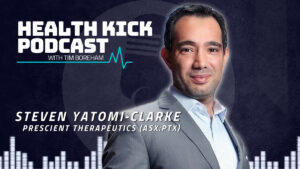CAR-T therapy is leading the race as the holy grail to cure cancer but like many medical therapies it is not without problems, which Prescient Therapeutics is working to overcome.
Cancer is the second leading cause of death globally to heart disease and a devastating and widespread illness.
While there have been significant advances in treatment in recent years, Chimeric Antigen Receptor (CAR) T cell therapy is the one being put on a pedestal.
CAR-T is a new form of personalised immunotherapy using a patient’s own T cells that are enhanced to seek and destroy cancer cells.
But while CAR-T has shown unprecedented results in patients with certain blood cancers remaining cancer-free for more than 10 years, it is not without its risks and drawbacks.
Prescient Therapeutics is working to overcome these problems to bring cutting-edge therapies to more patients and more types of cancer.
Problem 1 – Inflammatory response
PTX managing director and CEO Steven Yatomi-Clarke said CAR-T is a living medicine using a patient’s immune cells (T-cells) which are good at fighting infection but do not recognise cancer cells.
“In a lab, a receptor is introduced to the patient’s T-cells which now enables it to bind to and kill cancer cells, so you are redirecting the T cell to a cancer target,” he said.
“The limitations are based on the fact it is a living cell, so it grows and divides continuously in the body.”
He said there is no way for the doctor to control these CAR-T cells once they are infused into the patient.
“When safety issues arise – and they arise all too often – doctors can do nothing except for treating the symptoms,” he said.
“In the worst-case scenarios, these therapies are so vigorous they have actually killed some patients, in a manner similar to the huge inflammatory responses that were killing COVID-19 patients at the start of the pandemic.”
Problem 2 – Nailing the target
Yatomi-Clarke said another problem is knowing what cancer surface target (antigen) to direct the CAR-T cell against.
This is made trickier by tumours that constantly change their antigens to evade the immune system.
Furthermore, these targets on the surface of cancer cells are often also present on the surface of healthy cells.
“All of a sudden you could have these CAR-T cells attacking healthy tissue, which can cause considerable safety issues and can be life-threatening – especially if you can never turn off this attack,” he said.
“Another significant challenge is what happens if the tumour mutates, and you’re left with all the bad side effects of the CAR-T cells but none of the benefits because suddenly it is directed against a target that no longer exists.”
He said tumours mutate to evade the immune system – a little like how bacterial resistance emerges.
“Certain types of leukaemia and brain cancers for example are notorious for growing and changing quickly, so even if you develop a CAR-T against one target, by the time you give the therapy the cancer may have changed,” he said.
Problem 3 – Producing young and strong CAR-T cells
Yatomi-Clarke said another common problem is how to manufacture CAR-T cells efficiently and ensure they don’t get “puffed out” or exhausted when infused back into the patient.
“At the moment another big limitation is developing CAR-T cells that don’t get exhausted before the job is done,” he said.
“It’s still a very bespoke product and you are reliant on each manufacturer having a bit of a green thumb and making an optimal cell product.
“Patients who respond really well tend to be, among other things, those whose CAR-T manufacturing process resulted in a more youthful type of cell that will last longer. But, unfortunately, most of the time it is a more mature cell that runs out of steam.”
Problem 4 – Tumour microenvironment (TME)
Yatomi-Clarke said the TME is like a protective force field that the tumour builds around itself to deliberately keep out the immune system.
“It keeps out all of the cops, if you like, so the cancer thrives unchecked, growing and spreading faster,” he said.
“If CAR-T is going to move the needle in solid tumours then it firstly has to find the way to the site and then find a way to penetrate this TME force field.”
Problem 5 – Too slow with prohibitive costs
Yatomi-Clarke said it is becoming apparent that a single infusion of CAR-T cells won’t be as effective for solid cancers as for haematological cancers.
He said furthermore, targeting a single cancer antigen is not going to sufficient in most cases either.
“Current technologies would therefore require multiple CAR-T products to be made per patient, each with its own regulatory requirements, each costing hundreds of thousands of dollars and taking weeks to manufacture,” he said.
“This is too long and way too expensive on a per patient basis.“
CAR-T limited to those with few options
Yatomi-Clarke said because of safety limitations, current CAR-T therapies are only reserved for “the sickest of the sick” with no alternatives and for whom you can justify the risk.
“Some people are erroneously saying safety is not a problem anymore for CAR-T but that is not true.”
He said all doctors can do is treat the symptoms of inflammation associated with CAR-T therapy and the reality is that to even receive the treatment, patients need to be in an ICU bed.
“So, it is limited to these types of patients and to make it more accessible we need to get the therapies safer so you’re not waiting until these patients are on death’s door with no other options and hopefully, they can be outpatients instead of being in ICU,” he said.
Overcoming the problems
For investors it’s important to understand PTX’s role in the emerging CAR-T cell therapy field.
Essentially, PTX is at the forefront of overcoming the problems to make CAR-T cell therapy safer, more efficient, cost effective and essentially that longed-for holy grail of cancer treatment.
Prescient is working with world-leading cancer centres worldwide. PTX’s OmniCAR platform employs technology licensed from UPenn, the pioneer and world leader in CAR-T, as well as Oxford University.
Yatomi-Clarke said OmniCAR is a modular “plug and play” platform that enables Prescient to use CAR-T cells like a Lego set.
“We can attach any binder onto these OmniCAR T cells to direct them against any cancer target – even at the same time,” he said.
“The same modular feature enables us to control the activity of the cells even once they’re infused, and even switch them off, to create CAR-T cells with unprecedented efficacy, control, and safety.”
Prescient’s complementary cell therapy enhancement platform CellPryme-M is a 24-hour, non-disruptive process during cell manufacturing.
CellPryme-M shifts T and NK cells towards a more “youthful”, longer lasting, central memory phenotype, improving persistence, and increasing the ability to find and penetrate tumours.
PTX’s CellPryme-A is an adjuvant therapy designed to be administered to patients alongside cellular immunotherapy that boosts the tumour killing capabilities of CAR-T therapies and increases host survival.
To be administered to cancer patients as an intravenous (IV) infusion, it breaks down the protective TME, significantly increasing expansion of CAR-T cells inside the body and helping CAR-T cells penetrate the tumour.
Notably, CellPryme can be “dropped into” clinical studies of existing cell therapies, thereby opening opportunities for external collaborations for Prescient.
“Our platforms work to address not one or two, but all the challenges facing the whole cell therapy field,” Yatomi-Clarke said.
To learn more about Prescient Therapeutics, visit their investor portal.
This article was developed in collaboration with Prescient Therapeutics, a Stockhead advertiser at the time of publishing.
This article does not constitute financial product advice. You should consider obtaining independent advice before making any financial decisions.
You might be interested in












